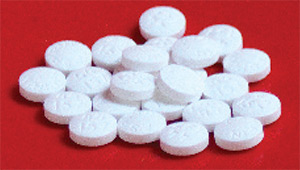Aspirin May Lower the Risk of Prostate Cancer
 A new study found that the use of aspirin and/or other nonsteroidal anti- inflammatory drugs (NSAIDs) was associated with a reduced risk of prostate cancer.
A new study found that the use of aspirin and/or other nonsteroidal anti- inflammatory drugs (NSAIDs) was associated with a reduced risk of prostate cancer.
Researchers followed 6,390 men who had a PSA of 2.5-10 ng/mL and a negative biopsy result at the start of the study. Half of the men in the study took aspirin and/or another NSAID. The other half of the men did not take these drugs.
After 4 years, researchers found that men who took aspirin and/or NSAIDs had a 13% lower risk of developing prostate cancer. These men also had a 17% lower risk of developing aggressive prostate cancer.
The researchers did not have data on dose or frequency, which is a limitation of the study. Study author Adriana Vidal, PhD, of Duke University said, “Our data support the hypothesis that anti- inflammatory drugs may have a biological role in arresting prostate cancer development, but this requires formal prospective testing in randomized trials. In the meantime, men should discuss with their doctors the benefits and risks of taking these medicines to potentially lower prostate cancer risk.”
The men in the study were part of the REDUCE trial, sponsored by GlaxoSmithKline. The trial was designed to test whether dutasteride, a drug for enlarged prostate, reduced the risk of prostate cancer.
How Does Aspirin Reduce Cancer Mortality?
Previous studies have suggested that taking aspirin or other NSAIDs—even at a low dose—could reduce the incidences of cancer death and metastasis. These drugs block the enzyme COX-1, which is commonly found in platelets. Blocking COX-1 inhibits the adherence of platelets to cancer cells to prevent metastatis. A recent study at Vanderbilt University found that aspirin also inhibited production of the enzyme COX-2, which reduced levels of prostaglandin E2 (PGE2). PGE2 is a hormone that spurs cancer metastasis.
Research from these studies was presented at the 13th Annual American Association for Cancer Research (AACR) International Conference on Frontiers in Cancer Prevention Research.











